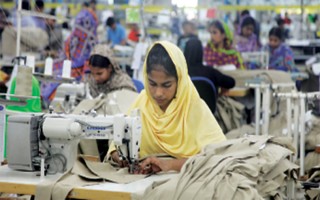Slump in India rupee, others may hit Bangladesh export
A rapid depreciation of emerging market currencies, including Indian rupee, will hit Bangladesh’s export competitiveness and may cause rise in payments for cheap imports, economists and exporters fear.
They apprehend that Bangladesh’s competitiveness in readymade garments exports to the US and the EU countries may be affected as the currencies of most of the countries competing with Bangladesh, including India and Indonesia, witnessed a drastic fall in their value against the dollar while Bangladesh’s currency remained almost static in the last few months.

Economists have observed that due to the depreciation of the currencies of India and China, imports from the countries are getting cheaper for Bangladesh, which may put pressure on its current account balance.
The currencies of all emerging countries fell against the dollar in last few months because of escalating trade war between the United States and China and the US sanction on Turkish officials over the detention of a US pastor.
According to the Bloomberg statistics, Indian rupee depreciated by 10.04 per cent against the dollar in the current year, while the currency of Indonesia fell by 7.89 per cent. Indian rupee fell to a record low of 71 per dollar in opening trade on Friday.
The data also show that Chinese yen depreciated by 4.85 per cent in the year.
Bangladesh Bank data show that taka depreciated only by 1.26 per cent against the dollar in the current year and stood at 83.75 against the dollar.
‘Bangladesh is passing through a tough time in international business as the currencies of all emerging countries have devalued against the dollar due to the US-China trade tension while taka is appreciating,’ Policy Research Institute executive director Ahsan H Mansur said.
He said that the depreciation of currencies of competing countries would reduce the competitive edge of Bangladesh in the RMG export market and also encourage cheap imports from India and China that might put pressure on the country’s current account balance.
Bangladesh is the second largest RMG exporter in the world with around $30 billion in annual export value while India’s annual RMG export stands at around $17 billion and that of Indonesia around $13 billion.
RMG export from China, the leading manufacturer with around $158 billion, however, is also likely to be hit, despite a fall in its currency value, because of its trade war with the US.
Bangladesh’s imports from both China and India, the two largest sourcing countries for Bangladesh with around $19 billion in annual total payments, is likely to rise because of the devaluation of the countries’ currencies as the products of the countries would be cheaper.
Due to the drastic fall of the rupee against the dollar, India would attract huge amount of foreign currency from Bangladesh as the highest number of Bangladeshis travel to India every year for the purpose of tourism and treatment, Mansur said.
According to the Indian tourism ministry, over 21.50 lakh Bangladeshis visited India in 2017, which is 60 per cent higher from 13.7 lakh in the previous year of 2016.
Suggesting a devaluation of the taka against the dollar, Mansur said that the government should ensure a balanced policy for export and import.
He said that devaluation of the taka would make the country’s export sector more competitive in the global market.
Former BB governor Salehuddin Ahmed said that depreciation of currencies of the competing countries, including India, would create problems for Bangladesh to remain competitive in export business.
He also said that the trend would encourage import from India and might put pressure on Bangladesh’s balance of payment.
Salehuddin suggested that the central bank rethink whether it would devalue the taka against the dollar or not.
‘If we want to remain competitive in the international business, we have to follow the international policy. We demand same facilities which our competing countries are enjoying to increase their export business in the global market,’ Abdus Salam Murshedy, president of Exporters Association of Bangladesh, told New Age on Saturday.
He warned that if the government made delay in following the international policy, it would be difficult for Bangladesh to achieve its export target.
Faruq Hassan, senior vice-president of Bangladesh Garment Manufacturers and Exporters Association, said that the government should introduce an export-friendly exchange rate, otherwise the RMG sector would have to face difficulties in the global market.
‘We are already in a disadvantaged position and our competitive edge is eroding as cost of doing business is increasing. Considering all the things including increasing wage for workers and high prices of gas due to LNG, the government should provide policy support to the RMG sector,’ he said.
News Courtesy: www.newagebd.net











